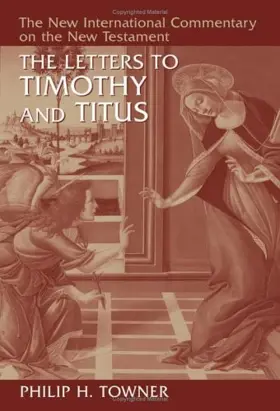

The Letters to Timothy and Titus
in New International Commentary on the New Testament
Pages
883
Publisher
Eerdmans
Published
1/1/2006
ISBN-13
9780802825131
Collections
This book appears in the following featured collections.
- Favorite Advanced NT Commentaries by Jeremy Pierce (parableman)
- Recommended NT Commentaries by Denver Seminary Journal
- D. A. Carson's Commentary "Best Buys" by D. A. Carson
- Ultimate Commentary Collection: NT Technical by John Glynn
- Essential Pauline Commentaries by Marcus Maher
- New Testament Advanced Commentaries by Moore Theological College Journal: Societas
- Basic Library Booklist by Detroit Baptist Theological Seminary
- Building an NT Commentary Library by Invitation to Biblical Interpretation (Kostenberger & Patterson)
- The Pastor’s Bookshelf by Scot McKnight
- New Testament Commentaries & Monographs by Princeton Theological Seminary
- Recommended New Testament Commentaries for Evangelical Pastors by Thomas R. Schreiner
Reviews
A sensible, erudite work.
Towner has devoted many years to the study of these letters and is considered an expert within the evangelical tradition. Towner offers robust arguments for Pauline authorship, plausible theories about the situations behind these texts, and is thoughtful about the theological relevance of their messages for today.
[Full Review]
Towner, an evangelical scholar and leading expert on the Pastoral Epistles, defends Paul’s authorship and exegetes the epistles in detailed engagement with modern scholarship in what may be the longest commentary on the Pastoral Epistles in print.
[Full Review]
Written from a firmly evangelical perspective, affirming Pauline authorship. This commentary is thorough, interacting fairly and charitably with other secondary material. Some may be unhappy with Towner's egalitarian leanings expressed in his exegesis of 1 Tim. 2 and elsewhere (personally I favour this view, though I might nuance my reading a bit differently than Towner does), but it cannot be argued he isn't thorough, or firmly based exegesis of the text as inspired. This is at the upper end of the semi-technical category, so to used to its fullest extent, some formal theological education is needed. But for Pastors and scholars, this is definitely one to have.
This is my main jumbo commentary (almost 900 pages), the only one after Stott that I made sure to read in its entirety on each passage before preparing the lecture. It’s the one I read quickly to get a reliable report on the state of scholarship and key issues on a passage to make sure I wasn’t missing anything, and then to dig in deeper where needed. Towner is wonderfully committed to expounding the close connection between doctrine and ethics in the pastorals, and the running argument of this commentary carries out the program argued monographically in his earlier book The Goal of Our Instruction: The Structure of Theology and Ethics in the Pastoral Epistles. Several things follow from this commitment: Towner respects the doctrinal passages in their own right more than some commentators have, perceives much thematic unity and some careful structure in the letters, is alert to how the author transforms a basically Hellenistic moral vocabulary for Christian usage, and thinks Paul is that author (though Towner canvasses alternatives and often writes in a way that would render this commentary equally helpful for readers who deny Pauline authorship)
[Full Review]
While not as technical as George Knight’s volume, this one still weighs in at a hefty 900 pages and should probably be the first choice for teacher or preachers who do not have knowledge of Greek and, therefore, cannot get a lot out of the NIGTC. Towner provides a conservative interpretation that assumes Pauline authorship.
[Full Review]
Towner’s recent commentary in the New International Commentary series is an excellent exegetical commentary. The body of the commentary proceeds through the text phrase-by-phrase, with Greek treated in the footnotes in detail. Towner has excellent exegetical notes and also demonstrates a expertise in Greco-Roman literature as well, especially in the virtue / vice lists. I also mention here his IVP volume, written more than ten years before the larger commentary. This series is designed for busy pastors who need a basic commentary, although an interested layman would find this a very readable commentary. His comments are on the English Bible and all references to Greek are in footnotes.
[Full Review]
Very thorough and illuminating
[Full Review]
And at the top of the heap, and the only one you need if you have it, is Phil Towner
[Full Review]
Philip Towner's commentary in the NICNT series is less technical than Knight's, but it is still an imposing work at over 900 pages. Despite its length, it remains accessible to most educated readers. Like Knight, Towner rejects the conclusions of critical scholars who deny Pauline authorship of the Pastoral Epistles.
[Full Review]
The Catholic University of America Washington, D.C. Towner’s commentary on the Pastoral Epistles, a title that he eschews, is certainly one of the largest, if not the largest, commentary to appear in English on these letters in recent years. Towner was well suited for the task. A revised version of his doctoral thesis, The Goal of Our Instruction, appeared under the Sheffield imprint almost twenty years ago. Since then he has not only published a number of articles on the Pastoral Epistles, but he has also worked with I. Howard Marshall in the preparation of the latter’s ICC volume on the Pastorals. Towner’s disavowal of the “Pastoral Epistles” nomenclature forms a ring construction around his 89-page introduction (2, 88–89). At bottom he is less concerned with Pastoral Epistles language than he is with the idea that the use of such language promotes the idea that the three letters should be read as a single corpus. Towner prefers that they be read as individual compositions, with each individual letter serving as the primary context for the interpretation of any of its parts. At best, following an opinion promoted by Luke Timothy Johnson, Towner would allow that the three letters be identified as a cluster, similar to the Romans-Galatians, 1–2 Corinthians, and Ephesians-Colossians clusters of the Pauline epistles.
[Full Review]













